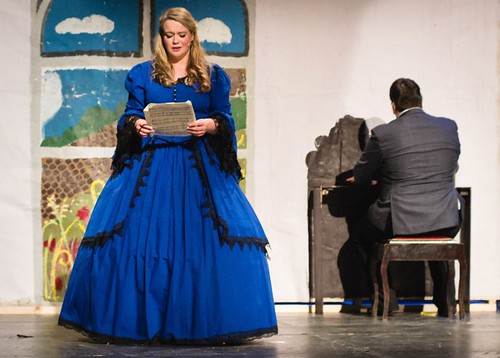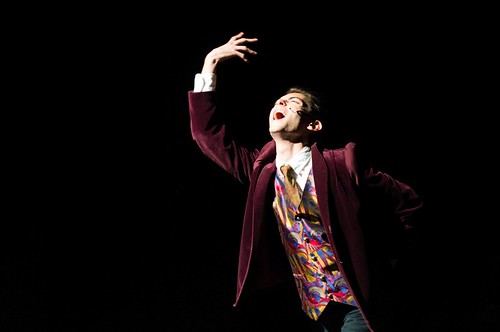Review – The Mystery of Edwin Drood
✭✭✭✩✩ Exuberantly immersive
Pleasance Theatre
Tue 19 – Sat 23 November 2013
Review by Thom Dibdin
Sprightly and spirited, Eusog’s take on the musical version of Charles Dickens’ unfinished final novel immerses its audience in the show from before curtain up.
The 1985 musical by Rupert Holmes uses a play-within-a-play device which places the whole show in London’s Music Hall Royale in late Victorian times.
Here the exuberant house-ensemble usher their audience to their seats, while explaining the show and its structure, before taking to the stage and launching into the Dickens.
Or at least, launching into as much of it as was completed when he died. Led by the excitable Chairman as master of ceremonies, the deconstructed story with its principal players is announced, culminating in the show’s big gimmick – a succession of audience votes as to how it should end.
The mystery concerns one Edwin Drood, young bachelor of the parish of Cloisterham. He is just about to marry Rosa Bud – an arrangement made when they were both children. One stormy Christmas eve, as he is walking down by the river, he disappears leaving only a bloodied cape.
The initial question is whether he has been murdered or simply disappeared. But there are more.
Who is the mysterious Dick Datchery who wanders the streets of Cloisterham these months after Drood’s disappearance? If Drood was murdered, who by? And, given that a romantically happy ending of some sort should be contrived, between which of the characters should it be?
The solution of all these conundrums were taken by Dickens to his grave. And it is these on which the audience is asked to vote – variously by acclaim and ballot.
Holmes’ structure gives a near-pantomime feel to the production, bringing in audience participation but also giving the cast plenty of space to play with the idea of their dual characters on stage.
Dominic Corbett does a fine job as the Chairman, introducing the various players and pointing up the clues left by Dickens as the possible outcome of the novel, as their interactions are observed.
Just the right level of overplayed caricature
Under Rebecca Simmonds’ direction, the company do well in bringing the characters of the novel to the stage.
Campbell Keith is a suitable lecherous villain as two-faced Drood’s uncle, the fawning, vile, opium-smoking John Jasper. Only a few years Drood’s senior, he is in love with Rosa – to whom he gives singing lessons – and hates Drood with a bitterness he can barely suppress.
Rosa, unlike Drood, is quite aware of Jasper’s attentions and has no interest in them. Secretly, she and Drood both want to give up their arranged marriage. Alexandra Pittock gives her just the right sense of the fearful rabbit, caught in his headlights. And some fine singing in Moonfall, the salacious song he forces her to sing.
Around these two who feature most in Drood’s life, revolve a succession of minor characters. Notably the Landless twins, orphans from Ceylon who are under guardianship of the reverend Crisparkle. And certified villain, The Princess Puffer, who runs the opium den where Jasper gets his fix.
All four are given just the right level of overplayed caricature to fit in with the music-hall scenario. Zachary Small is particularly compelling as Neville Landless – who falls for Rosa at first sight – while Austin Nuckols has plenty of comic presence as the Reverend Crisparkle and Lucy Evans is a forceful Helena Landless.
It is Ari L’Heveder as Princess Puffer who joins Rosa in being given the greatest opportunities to let their voices shine. Indeed, on an opening night beset with technical difficulties in the sound department, they stood out as creating moments of beauty where, in many instances, there was confusion. Puffer’s The Garden Path to Hell and Rosa’s duets with Drood (Perfect Strangers) and Jasper (The Name of Love) began to show what the company are capable of.
While Simmonds has done well in creating the music-hall feel to the show, and the novel’s characters are clearly portrayed, she has had less success in creating the feel of a music hall ensemble.
Only the very excellent Giselle Yonace, as “notorious master and mistress of male impersonation” Alice Nutting, who plays Edwin Drood, comes close in any real sense to the feel of being a music hall turn. Yonace has the star-turn’s strut and swagger as Alice, as well as a being a commendable Drood.
The rest of the company, in their fancy crinolines and tight waistcoats, have more of a Victorian dinner party feel to them. The many instances of audience participation provide plenty of opportunity to explore the slightly scabrous and decadent individuals indicated by the Chairman’s script, but this is never acted upon.
There is plenty here to entertain, particularly as the production enters the voting stage toward its 420 possible endings. But, despite heartfelt performances from the band under Ashton Brower’s musical direction, little to indicate why the original Broadway production garnered five Tony awards.
Running time 2 hrs 35 mins
Run ends Saturday 23 November 2013
Daily 7.30pm, Sat Mat 2.30pm
Pleasance Theatre, Pleasance, 48-60 Pleasance, EH8 9TJ
Edinburgh University Savoy Opera Group website: www.eusog.org
Tickets from www.xtspro.com
Click above to purchase the OST from Amazon
ENDS






















